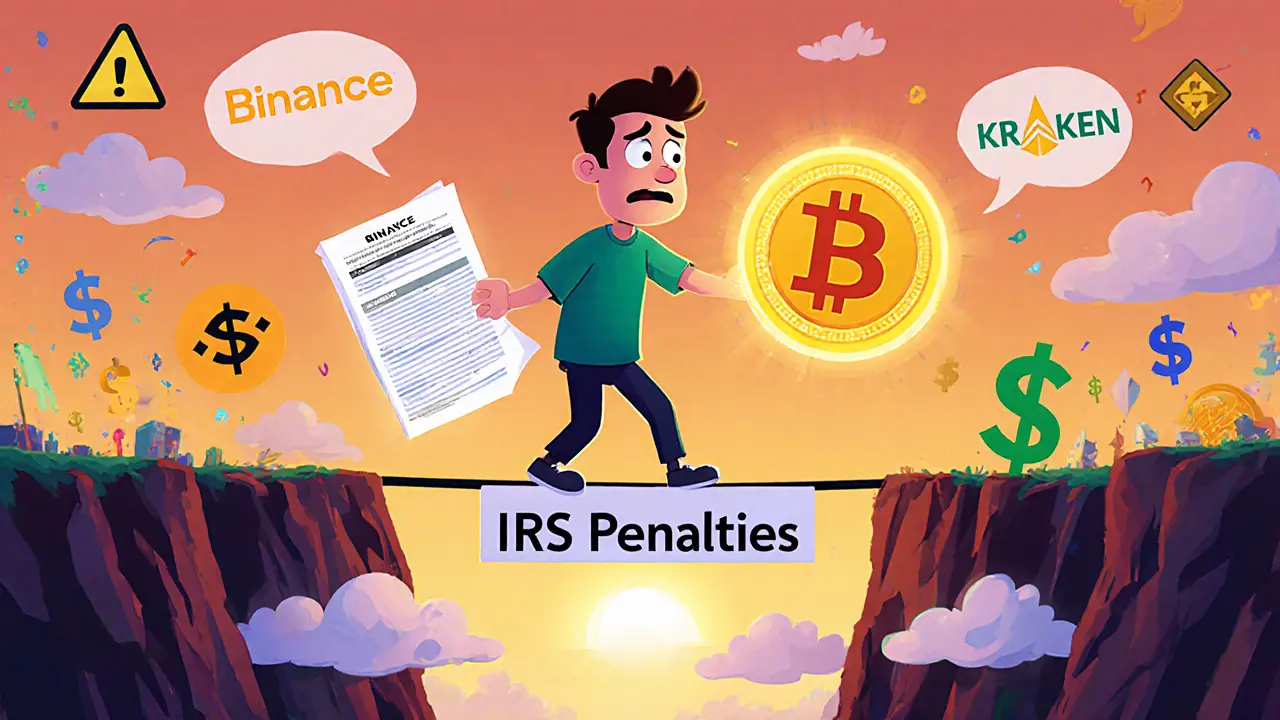FATCA Reporting Threshold Calculator
Check Your Reporting Requirements
Enter your situation to determine if you need to report cryptocurrency holdings under FATCA and FBAR rules.
If you're a US citizen holding cryptocurrency on a foreign exchange, you're likely already walking a tightrope between compliance and confusion. The IRS doesn't send reminders. No one calls to warn you. And if you're sitting on $50,000 or more in Bitcoin, Ethereum, or any other digital asset overseas, you could be facing penalties-no matter how small your transaction history is. This isn't about tax evasion. It's about FATCA and the murky rules around crypto that even many accountants are still figuring out.
What FATCA Actually Requires
FATCA, or the Foreign Account Tax Compliance Act, was passed in 2010 to stop Americans from hiding money offshore. It forces foreign banks, investment firms, and other financial institutions to report accounts held by US persons to the IRS. If you're a US citizen-even if you live in New Zealand, Canada, or anywhere else-you have to report certain foreign financial assets if they cross specific value thresholds. The numbers matter:- If you're single and living in the US: report if your foreign assets hit $50,000 on the last day of the year, or more than $75,000 at any point during the year.
- If you're married filing jointly and living in the US: the threshold is $100,000 at year-end or $150,000 at any time during the year.
- If you're living abroad: thresholds are higher, but they still apply. For single filers, it's $200,000 on the last day or $300,000 at any time.
Does Cryptocurrency Count as a Foreign Financial Asset?
Here’s where it gets messy. The IRS hasn’t issued a clear, official statement saying: “Yes, crypto on Binance or Kraken is a FATCA reportable asset.” But they also haven’t said “No.” And in tax law, silence usually means “yes, you’re on the hook.” FATCA defines “specified foreign financial assets” broadly. It includes:- Financial accounts held at foreign institutions
- Stocks or securities issued by non-US companies
- Financial instruments with non-US counterparties
FBAR Is Also in Play
Don’t forget about FBAR. That’s FinCEN Form 114, the Foreign Bank and Financial Account Report. It’s separate from FATCA. It’s filed directly with FinCEN, not the IRS. And until recently, crypto wasn’t included. But in 2024, FinCEN proposed new rules that would explicitly bring cryptocurrency accounts under FBAR reporting. If you held more than $10,000 in crypto on foreign platforms at any time during the year, you’ll need to file FBAR-on top of Form 8938. That’s double reporting. Double risk. Double paperwork. Example: You have $12,000 worth of ETH on Binance (based in the Cayman Islands). You also have $8,000 in BTC on Kraken (based in Malta). That’s $20,000 total. You need to file both Form 8938 and FBAR. The IRS doesn’t care if you didn’t sell anything. You didn’t earn income. You didn’t move funds. Just owning it above the threshold triggers the requirement.
How to Value Your Crypto for Reporting
Crypto prices swing wildly. A Bitcoin that was worth $60,000 in January might drop to $45,000 by December. Which value do you use? The IRS says: use the fair market value on the last day of the tax year. If you’re reporting at any point during the year (because you crossed the $75,000 threshold mid-year), use the highest value reached during that period. But here’s the problem: most foreign exchanges don’t give you a clean year-end statement. They don’t email you a CSV with daily balances. You’re on your own to track it. Many US taxpayers use crypto tax software like Koinly, CoinTracker, or TokenTax to auto-import transactions and calculate values. If you’re using a foreign exchange that doesn’t integrate with these tools, you’ll need to manually record daily prices from CoinGecko or CoinMarketCap. Write it down. Save screenshots. Keep backups. The IRS accepts “reasonable methods” for valuation. But if you’re off by $20,000 and get audited, you’ll need proof you weren’t just guessing.What If the Exchange Doesn’t Give You an Account Number?
Traditional banks give you account numbers, addresses, SWIFT codes. Crypto exchanges? Not so much. Form 8938 asks for “account number” and “financial institution address.” What do you put if you’re holding crypto on a platform that doesn’t issue account numbers? The IRS says: use your login email or username. For the address, write “unknown” or “foreign exchange platform-no physical address provided.” They’ve seen this before. They’re not going to reject your form because you didn’t have a bank routing number. Pro tip: Keep a record of your login credentials, the exchange’s legal entity name (usually found in their Terms of Service), and the country where they’re headquartered. That’s your audit trail.Other Tax Reporting You Can’t Ignore
FATCA and FBAR are just the tip of the iceberg. Every time you:- Sell crypto for USD
- Trade one crypto for another
- Use crypto to buy goods or services
- Receive crypto as payment

What Happens If You Didn’t Report?
If you’ve been holding crypto overseas and never filed Form 8938 or FBAR, you’re not alone. Many people didn’t know they had to. But the IRS is catching up. They now cross-reference data from foreign exchanges that have signed FATCA agreements. Over 100 countries participate. Thousands of platforms report. Your name, email, transaction history-it’s already in their system. The good news? The IRS has voluntary disclosure programs. If you come forward before they contact you, you can file amended returns, pay back taxes and interest, and often avoid criminal penalties. Don’t wait for a letter. Don’t hope it’ll go away. The clock is ticking.What Should You Do Now?
Here’s your action plan:- Identify every foreign exchange or wallet custodian where you’ve held crypto since 2010. Include Binance, Kraken, Coinbase International, Bitstamp, etc.
- Calculate the highest value of your crypto holdings on each platform during each tax year since 2010.
- Check if any year exceeded the FATCA threshold ($50K/$75K for US residents).
- Check if any year exceeded $10,000 in total foreign crypto holdings-this triggers FBAR.
- Use crypto tax software to generate Form 8949 and Schedule D for all trades and income events.
- Consult a US tax professional experienced in crypto and FATCA. Don’t rely on generic CPAs.
- If you missed filings, consider filing under the IRS’s Streamlined Filing Compliance Procedures.
What’s Coming Next?
The IRS and FinCEN are moving fast. Expect:- More foreign exchanges to be forced into FATCA compliance
- Clearer guidance on non-custodial wallets and DeFi protocols
- Integration of crypto data into automated IRS matching systems
- Increased penalties for non-compliance
Do I have to report crypto on FATCA if I never sold it?
Yes. FATCA is about ownership, not transactions. If you held $50,000 or more in crypto on a foreign exchange at any point during the year, you must report it-even if you didn’t sell, trade, or earn anything. The IRS cares about the value of what you own, not what you did with it.
What if my crypto is in a non-custodial wallet like MetaMask?
If you bought the crypto through a foreign exchange and transferred it to MetaMask, the original purchase still counts as a foreign financial asset. The IRS looks at the source. If the exchange is foreign and you held the asset through them-even briefly-it’s reportable. If you only ever bought crypto using a US exchange and moved it to MetaMask, it’s not reportable under FATCA.
Can I just ignore FATCA if I live outside the US?
No. US citizens are taxed on worldwide income and assets, no matter where they live. If you’re a US citizen living in New Zealand, Australia, or anywhere else, FATCA still applies. The thresholds are higher for overseas residents, but they still exist. Ignoring it doesn’t make it disappear.
What’s the difference between Form 8938 and FBAR?
Form 8938 (FATCA) is filed with your tax return to the IRS and has higher thresholds ($50K+). FBAR (FinCEN Form 114) is filed separately with FinCEN and has a lower threshold ($10K). You may need to file both. FBAR doesn’t go on your tax return, and the penalties for missing it are separate and can be criminal.
Do I have to report crypto I received as a gift?
If you received crypto as a gift from someone overseas and it’s held in a foreign wallet or exchange, you must report it on Form 8938 if the value meets the threshold. You don’t pay tax on the gift itself, but you still have to disclose the asset. The donor might have reporting obligations too.
Can I use crypto tax software to file Form 8938?
Most crypto tax tools generate Form 8949 and Schedule D, but not Form 8938. You’ll need to manually complete Form 8938 using the data from your software. Some tax professionals use specialized platforms that auto-fill Form 8938, but standard tools like Koinly or CoinTracker won’t do it for you. Always double-check the form with a pro.
What if I closed my foreign crypto account last year?
You still have to report it for every year you held it above the threshold. Closing the account doesn’t erase your past obligations. You’ll need to report the highest value during each year you held it, even if you sold or transferred it before year-end.
Are staking rewards or DeFi yields reportable under FATCA?
The rewards themselves are taxable income and must be reported on Form 1040. The underlying crypto assets used to earn those rewards are subject to FATCA reporting if held on a foreign platform. So yes-both the income and the asset need to be accounted for.




16 Comments
Louise Watson
Just report it. Seriously.
Liam Workman
Man, I used to think crypto was my escape from the system… turns out the system just got better at finding you. 🤦♂️
Now I use Koinly, screenshot every price swing, and keep a folder labeled ‘IRS Bait’ with all my exchange logins. Better safe than sued.
Benjamin Jackson
I get why people panic about this stuff. But honestly? Most of us aren’t hiding millions-we’re just holding a few coins because we believe in the tech.
Still, I filed Form 8938 last year. Took me 3 hours. Paid a pro $200. Worth every penny. No nightmares since.
Leo Lanham
Oh wow, so now the government wants to know what crypto you’re hoarding like a dragon?
Next they’ll ask if you hugged your Bitcoin last Tuesday. 😭
They’re not taxing income anymore-they’re taxing *existence*.
Brian Webb
It’s wild how much of this feels like a trap. You’re told crypto is the future, then punished for owning it.
I held ETH on Binance for a year. Didn’t sell. Didn’t trade. Just… kept it.
Turns out, just having it was the crime. I’m not mad-I’m just exhausted.
Whitney Fleras
If you’re reading this and feeling overwhelmed-you’re not alone.
Start small. List your exchanges. Find your highest balance per year. Use a free tracker. Then talk to someone who’s done this before.
You don’t have to fix everything today. Just start.
Colin Byrne
Let’s be clear: FATCA is not a tax law-it’s a surveillance mechanism disguised as compliance. The IRS doesn’t want your money; they want your autonomy.
The fact that they now demand account numbers from platforms that don’t issue them proves this isn’t about transparency-it’s about control.
And don’t get me started on FBAR. Two forms, two agencies, two sets of penalties. This isn’t governance. It’s bureaucratic harassment.
What’s next? Mandatory crypto wallet audits? GPS tracking of your hardware wallet? The slippery slope is paved with Form 8938.
karan thakur
This is all a psyop. The IRS doesn't care about crypto. They care about controlling the population.
They know people are moving away from banks. So they invented FATCA to scare you back into the system.
They're working with Big Tech and the banks. You think your MetaMask is private? It's all logged. Every keystroke. Every transaction.
They're building the digital prison. And you're handing them the keys by filing these forms.
Kyung-Ran Koh
Just a quick note: if you’re using a non-custodial wallet like MetaMask, and you never interacted with a foreign exchange after the initial purchase, you’re likely NOT subject to FATCA. But if you bought via Binance, then moved it to MetaMask-that purchase event triggers reporting.
Also: always use UTC timestamps for your screenshots. The IRS loves consistency.
And yes, you need to report gifts-even if you didn’t sell. Don’t assume ‘no income = no reporting.’
Missy Simpson
OMG I just realized I forgot to report my 2022 Kraken balance 😭
It was only like $42k but then it spiked to $58k in November and I totally forgot…
Is it too late? Can I still fix it? I’ll do anything-just tell me what to do!! 🙏
Tara R
The notion that ordinary citizens must navigate this labyrinthine regulatory maze without professional guidance is not merely inconvenient-it is an affront to the principles of due process and equitable treatment under the law.
One does not simply file Form 8938 without a CPA who specializes in international tax law and blockchain asset classification.
Any suggestion otherwise is irresponsible and frankly, dangerous.
Matthew Gonzalez
I used to think the IRS was just about income. Now I realize they’re auditing my digital life.
I bought Bitcoin in 2021, moved it to a foreign exchange, forgot about it, and now I’m terrified I owe $50K in penalties.
Turns out, owning something you didn’t even think about counts as a crime.
What kind of society are we living in?
Michelle Stockman
So let me get this straight: I have to report crypto I didn’t sell, didn’t earn, didn’t even touch in years… just because I *owned* it?
Next they’ll tax me for breathing air that’s been taxed before.
At this point, I’m just waiting for the IRS to send me a bill for my dreams.
Eric von Stackelberg
There is no legitimate legal basis for treating non-custodial digital assets as foreign financial accounts under FATCA. The statutory language of FATCA refers to financial institutions, accounts, and instruments-none of which apply to decentralized, peer-to-peer blockchain systems.
The IRS is engaging in regulatory overreach under the guise of ‘interpretive guidance.’
This is not tax compliance-it is the weaponization of administrative ambiguity.
Legal scholars have challenged this in academic journals. The courts have yet to rule-but when they do, this entire framework will collapse under its own illogic.
Matthew Gonzalez
Wait, so if I bought crypto on a US exchange, then sent it to MetaMask, and never touched a foreign platform again-I’m fine?
But if I used Binance once in 2020 and then moved it to MetaMask? That’s a 15-year liability?
That’s insane. I’m not even a tax expert. How am I supposed to track that?
Kyung-Ran Koh
Yes, exactly. If you only used a US exchange (like Coinbase US) and moved to MetaMask-no FATCA. But if you ever used Binance, Kraken, Bybit-even once-you’ve triggered the reporting requirement for that entire holding, retroactively.
It’s not about what you did after. It’s about where the asset was *originally acquired*.
And yes-it’s brutal. But the IRS doesn’t care if you didn’t know. Ignorance isn’t a defense. Document everything. File amended returns. Use Streamlined Procedures. Don’t wait for a letter.